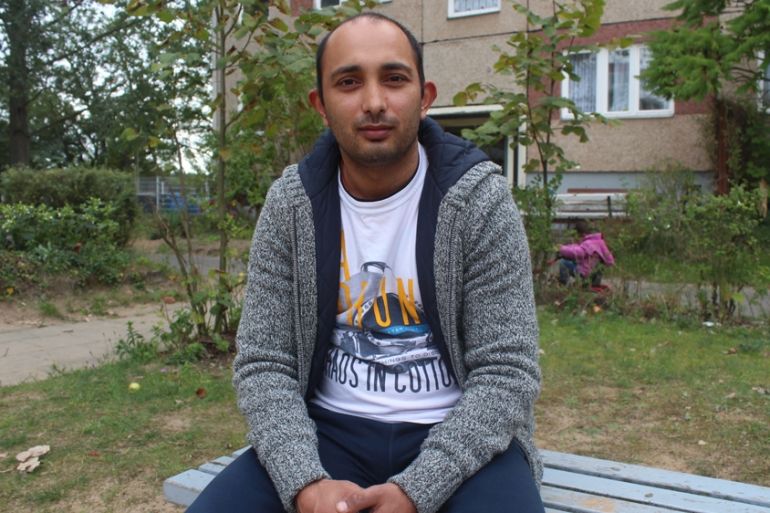Balkan asylum seekers fear deportation from Germany
In 2015, the number of asylum applicants from the conflict-free region surpassed those from Syria and Afghanistan.

In Germany, where a dramatic increase in asylum applications has been registered this year, much of the public and media attention has been devoted to refugees from war-torn countries like Syria, Afghanistan, and Somalia.
But more than 40 percent of the asylum applicants registered in Germany during 2015 originated from a conflict-free, neighbouring region – the Balkans.
Keep reading
list of 4 itemsPalestinian Prisoner’s Day: How many are still in Israeli detention?
‘Mama we’re dying’: Only able to hear her kids in Gaza in their final days
Europe pledges to boost aid to Sudan on unwelcome war anniversary
Some 167,287 citizens of Albania, Kosovo, Serbia, Macedonia, Montenegro, and Bosnia-Herzegovina applied for asylum in Germany between January 2014 and September 2015, including 110,716 this year alone. In the first nine months of 2015, the combined total of asylum applicants from Albania and Kosovo (79,848) surpassed the number of applications from Syrians (73,615), while there were more applications by Serbs (22,958) than by Afghans (16,360).
“The economic situation in these countries is poor,” German Interior Minister Thomas de Maiziere said of the Western Balkan countries, in a recent interview with the newspaper Bild. “It’s understandable that people are seeking a better future somewhere else. But that’s not a reason to grant asylum.”
In the past few years, German authorities have consistently rejected 99 percent of all asylum applications by people from the Balkans. Despite this, tens of thousands of mostly young Balkans continue to leave their safe-but-poor homelands for a chance at a new life in Europe’s strongest economy.
Djordje Buric, a 32-year-old asylum seeker from Serbia, is one of them.
Buric spent the first three decades of his life in Belgrade, before realising that for the sake of his children’s future, he had to attempt to build a life elsewhere.
“We finished school [vocational college], me and my wife also,” he explains. “I finished school for waiters, and she finished school for bakery. But in Serbia, it is very difficult to find jobs at this time. What can I do? Go to the shop and steal milk for my kids?”
Now, Buric lives with his wife and two children in a refugee facility on the outskirts of Neuhardenberg, a small German town near the Polish border. The Burics arrived in Germany in December 2013, after an 18-hour bus ride.
The family spent several months in temporary-stay refugee facilities, until they were allocated to Neuhardenberg in April 2014. German authorities have rejected their asylum applications, but Buric has appealed and their cases are currently pending.
OPINION: The EU’s stinking refugee deal with Turkey
Since they first handed in their asylum applications, the Burics have been receiving the government benefits given to all asylum seekers in Germany. That includes free accommodation, basic healthcare and a monthly allowance of 325 euros (around $355) per adult and half of that for every child. As a result, they have an income that is higher than what they would most likely be able to make in their homeland.
But the family only has temporary residence permits which can be revoked at any moment, and Buric says he is well aware that, at any time, German authorities can come and tell him: “Pack your stuff, you are going back to Serbia.”
|
|
Despite the uncertainty of their status, Buric dismisses the idea of his family voluntarily returning to Serbia.
As Roma people, Buric says, they face racial discrimination as well as a harsh economic reality in Serbia.
“They call us Gypsy – people of Roma – and it is very difficult for us to find a job,” he says. “I went for four years to school [vocational college], every day. My parents paid for that school for me and gave me everything that I need, but when I finished that school I cannot get work in my country because I am a little bit black, because I’m not white.”
“It is horrible when you live in your country and the people view you as a stranger,” he adds.
But Germany considers Serbia to be a safe country and Buric acknowledges that while he may not find his homeland welcoming, he faces no physical danger there.
Related: Why Al Jazeera will not say Mediterranean ‘migrants’
German authorities recently decided to toughen their stance against migrants from “safe countries of origin“, like Serbia, Bosnia-Herzegovina, and as of last month, Albania, and Kosovo.
The Federal Office for Migration and Refugees has placed advertisements in Western Balkans countries to inform locals that they shouldn’t come to Germany, because they won’t be granted asylum, explains Kira Gehrmann, a spokesperson for the office.
In an email exchange with Al Jazeera, Gerhrmann said the asylum applicants from Western Balkan countries who arrive in Germany today are concentrated in mass facilities near Germany’s external borders, from where they can be more promptly deported.

“Their applications are being prioritised right now in comparison to other nations,” said Gerhrmann. “The same is being done with applications from Syria. In the case of west Balkans, to be able to send them back faster, and in the case of people from Syria, to be able to integrate them into German society as fast as possible.”
Last week, Interior Minister De Maiziere said: “Tens of thousands of rejected asylum seekers from the Balkans would have to leave our country.” He vowed to speed up the deportations of those whose asylum claims have been rejected.
As a rejected asylum seeker, Buric knows he might be deported any day. He is frustrated that his asylum case has coincided with an unprecedented influx of people fleeing persecution and war and heading to Germany. He is afraid that the ongoing refugee crisis decreases his chances of being granted a more permanent residence status in the country.
But, despite feeling overwhelmed by the sense of insecurity, he says he’s trying to remain optimistic.
“I don’t know any more what to think because the situation with refugees is so complicated at the moment,” Buric reflects. “My dream is that one day I get [refugee status] and stay here. And I am going to fight until the end to make it happen. So, we’ll see.”